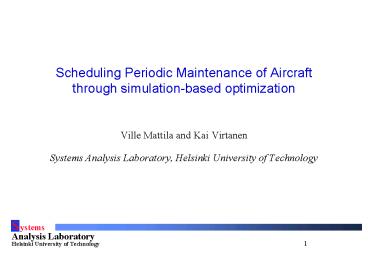Scheduling Periodic Maintenance of Aircraft through simulationbased optimization - PowerPoint PPT Presentation
Title:
Scheduling Periodic Maintenance of Aircraft through simulationbased optimization
Description:
... allocation governs the accumulation of flight hours and the actual timing of PM tasks ... The queuing times in the maintenance facilities indicate whether ... – PowerPoint PPT presentation
Number of Views:67
Avg rating:3.0/5.0
Title: Scheduling Periodic Maintenance of Aircraft through simulationbased optimization
1
Scheduling Periodic Maintenance of Aircraft
through simulation-based optimization
- Ville Mattila and Kai Virtanen
- Systems Analysis Laboratory, Helsinki University
of Technology
2
Contents
- The need for periodic maintenance (PM) scheduling
- Scheduling of PM tasks in the Finnish Air Force
(FiAF) - A simulation-based optimization model for the
scheduling task - Results from an example scheduling case
3
Aircraft usage and maintenance
Usage
Maintenance
Pilot and tactical training, air surveillance A
number of aircraft chosen each day to flight
duty Several missions during one day
Periodic maintenance Based on usage
Failure repairs Unplanned
Different level maintenance facilities
4
Periodic maintenance of a Hawk Mk51 training
aircraft
5
The need for PM scheduling
- Scheduling is done for two primary reasons
- Avoid degradation of aircraft availability
- Allow maintenance facilities to plan for supply
of resources
6
Scheduling vs. no scheduling
7
Difficulty of scheduling
- Starting times of PM tasks can not be assigned
with certainty - Timing depends on the maintenance interval and on
the usage of the aircraft - Usage is affected by unexpected failures and
subsequent repairs - Intervals are not adjusted during normal
conditions
8
Maintenance schedule
- A maintenance schedule consists of targeted
starting times of PM tasks - The schedule is used to allocate flight time
among aircraft by prioritizing aircraft with the
highest ratio of - The allocation governs the accumulation of flight
hours and the actual timing of PM tasks
9
The maintenance scheduling problem
- N the total number of aircraft
- X(x1,1,...,x1,n1,...,xN,1,...,xN,nN) the
maintenance schedule of the fleet - L simulated average aircraft availability
- ? sample path
10
The simulation optimization model
- A discrete-event simulation model
- Describes aircraft usage and maintenance under a
given maintenance schedule - Returns aircraft availability as output
- A search method
- Produces new schedules based on the simulated
availabilities - A genetic algorithm (GA) or simulated annealing
(SA)
11
A case example
- The scheduling case
- A fleet of 16 aircraft
- A time period of 1 year
- 4 of the aircraft each perform 4 daily flight
missions - 4 PM tasks scheduled per each aircraft in the
fleet - The performance of different configurations of GA
and SA in the case are compared
12
Design of experiment
- 300 evaluations of the simulation for each
combination of parameters
13
Results
- Highest average availability obtained in the
optimization
14
Analysis of the obtained schedule
- The simulation can be used to further assess the
schedule obtained in the optimization - The queuing times in the maintenance facilities
indicate whether the schedule can still be
improved - The simulation also provides information on the
distribution of times, when the PM tasks are
actually materialized
15
Concluding remarks
- The presented model has been implemented as a
design tool for FiAF - Final validation can be conducted by comparing
actual flight operations and maintenance with the
simulation - Future work includes the consideration of task
priorities in the optimization problem

